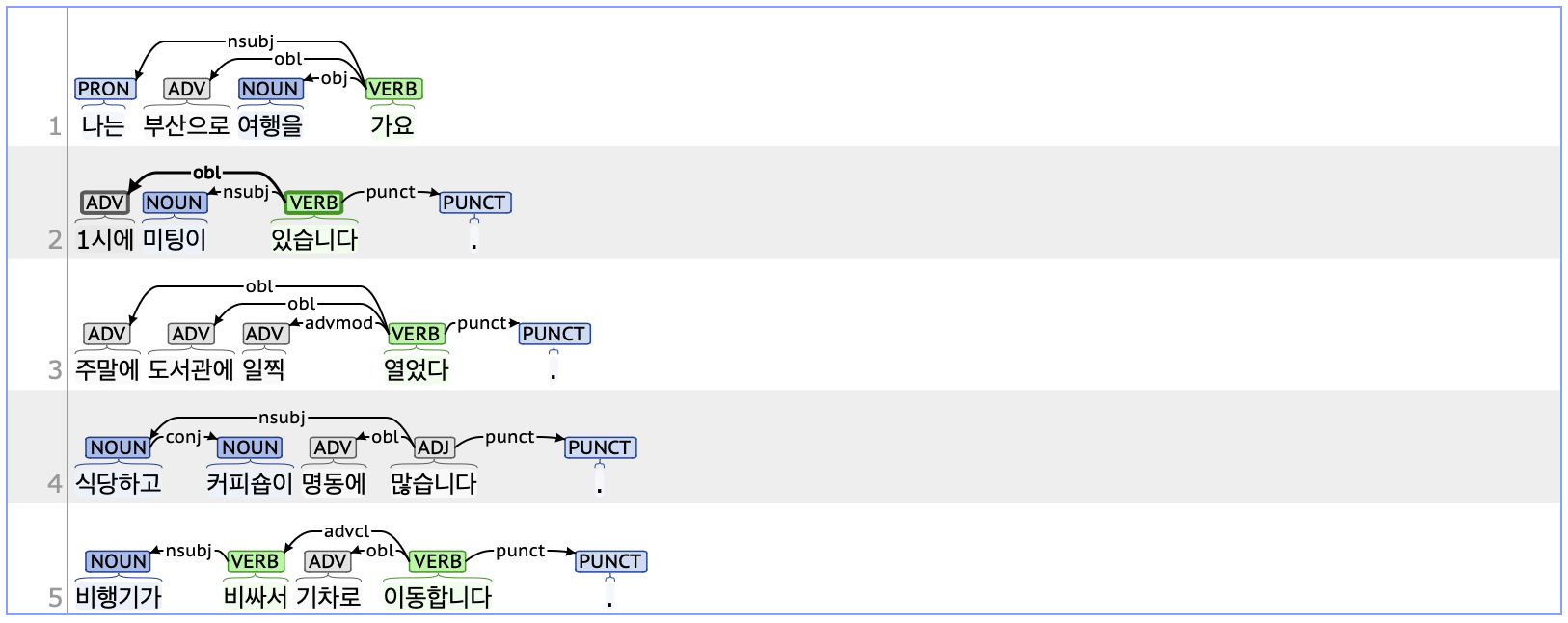obl: Oblique nominal
Definition
obl refers to a nominal adverb that functions as a sentence component modifying the predicate.
Characteristics
- The obl tag is typically composed of noun + JKB (Postposition_adverbial, 부사격 조사), such as ‘에게’, ‘에서’, ‘한테’, ‘에’, ‘(으)로’, and ‘께’.
- The obl tag provides additional information about direction, time, location, manner, or cause.
- Examples:
- 나는 부산으로 여행을 가요.
- 1시에 미팅이 있습니다.
- 우리는 바다 근처에서 식사를 했습니다.
- 비행기가 비싸서 기차로 이동합니다.
Boundary cases and clarifications
Differences with related tags
- obl vs. advmod (Adverbial modifier)
- Both the obl and advmod tags function as adverbials within a sentence. From a part-of-speech perspective, the obl tag generally includes a noun, whereas the advmod tag typically consists of either adverbs or verb stems combined with the suffix ‘-게’.
- Some Korean words such as ‘어제’ and ‘오늘’ can function as both nouns and adverbs, allowing for both obl and advmod tagging depending on the context.
- obl: 기차로 이동합니다.
- advmod: 천천히 이동합니다.
- obl vs. conj (Conjunct)
- Some JKBs (Postposition_adverbial, 부사격 조사) share the same surface form as certain JCs (Postposition_conjunctive, 접속 조사), such as ‘와/과’, ‘하고’, and ‘(이)랑’. When functioning as JKBs, they are parsed with the obl tag, whereas when functioning as JCs, they are related to the conj tag.
- The obl is used when the phrase modifies or specifies the predicate, while the conj indicates an equal relationship between two words or phrases in the sentence.
- The obl tag is generally dependent on the root of the sentence or clause, while the conj tag is dependent on a preceding word that it connects to as an equal.
- obl: 친구하고 커피숍에 왔습니다.
- conj: 식당하고 커피숍이 명동에 많습니다.
Special cases
- Nouns accompanied by prepositional words:
- When a noun is used with a word that functions like a preposition, it is typically tagged as obl. Common examples in Korean include ‘앞’(in front of), ‘옆’(beside), ‘뒤’(behind), ‘전’(before), and ‘후’(after).
- 학교 앞에서 친구를 기다린다.
- 학교 앞에서 친구를 기다린다.
- 식사를 마치기 전에는 먼저 일어나면 안 됩니다.
- When a noun is used with a word that functions like a preposition, it is typically tagged as obl. Common examples in Korean include ‘앞’(in front of), ‘옆’(beside), ‘뒤’(behind), ‘전’(before), and ‘후’(after).
Examples
